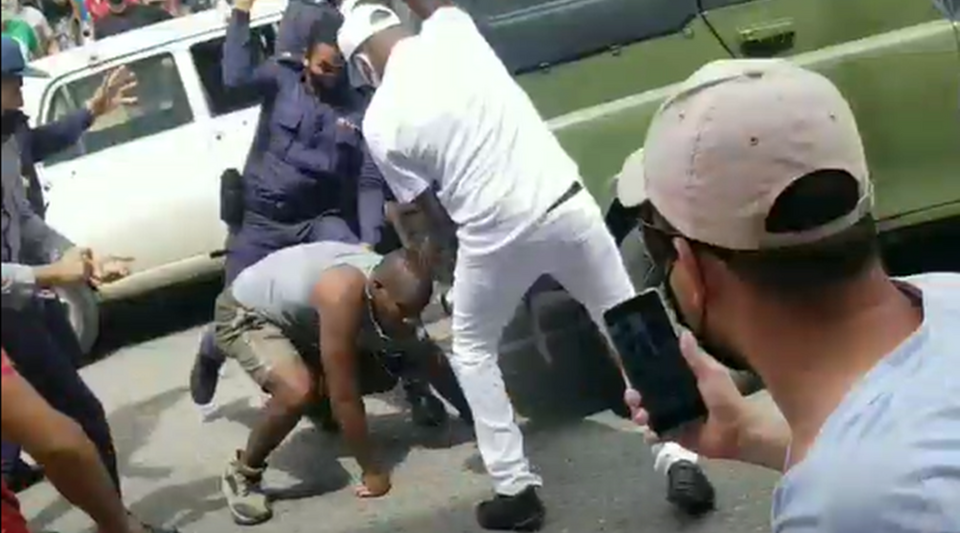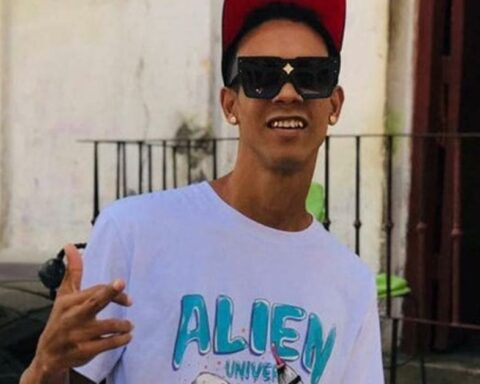The Cuban state has taken measures “manifestly contrary to the Convention against Torture.” It is the consideration of the UN Committee that is in charge of supervising the application of that norm in the countries that have signed it and that has been holding its 73rd session since April.
In his speech on Wednesday, the entity’s vice president, Sébastien Touzé, reviewed the “lack of respect for fundamental fundamental rights” that the island’s regime has carried out in recent months, such as freedom of expression, association, meeting and circulation.
Thus, the Committee Against Torture estimates that the “high number of arrests”, especially after “the events of July 2021” offers “an alarming view”.
“Confidence in the National Police has worsened,” said Touzé, who mentioned among the “hundreds of detained protesters” opponents José Daniel Ferrer and Luis Manuel Otero Alcántara.
“Once in the police station, he suffered cruel and degrading treatment, he was humiliated, he was beaten with a military boot and he was forced to say ‘long live the revolution’, and this has not been denied by the Government”
The vice president of the Committee also alluded to the case of rapper Denis Solís, sentenced to eight months in prison for contempt in a summary trial and, after completing his sentence, exiled from the island, which may involve “arbitrary arrest and secret detention.”
“Detained in secret, he was denied the opportunity to challenge his detention before a judge and was also not allowed to contact his lawyers or receive legal assistance, which deprived him of his right to defend himself effectively,” he recalled sternly. Touze. “Once at the police station, he suffered cruel and degrading treatment, he was humiliated, he was beaten with a military boot and he was forced to say ‘long live the revolution,’ and this has not been denied by the government.” This, he also said, “manifestly violates articles 2 and 16 of our Convention.”
Both arbitrary detention and secret detention are “something persistent and recurring in Cuba,” estimates the Committee, which ensures that, in addition to that, the Cuban government has violated other human rights, “especially through acts of torture.” .
“The repression of dissent seems to continue”, also affirms the Committee Against Torture. In this regard, Touzé cited figures from the Cuban Commission for Human Rights and National Reconciliation, which recorded 8,616 arrests in 2015 and 9,940 in 2016.
The agency’s vice president also attacked preventive detention, a recurring practice “to prevent a person from going to a place, for example, to participate in a demonstration,” a measure “without any legal basis.”
“The current Cuban Penal Code contains a whole series of provisions that allow incriminating citizens who oppose the established system in one way or another”
He also had words for the 55 minors who were arrested after the July 11 demonstrations, many of whom are still in custody and were sentenced to long sentences. “According to the testimonies of the Cuban press, there have been parents who do not even know the prison in which their children are detained,” lamented Touzé, for which reason “there is a flaw in the information that is communicated to those close to them regarding a detention”.
Regarding the analysis of the Cuban legal framework for repression, the Committee Against Torture detects that “in the framework of the Constitution, artistic freedom and that of the press are the main limitations, since they are conditioned by respect for socialist values”.
In addition, he analyzes, “the current Cuban Penal Code contains a whole series of provisions that allow incriminating citizens who oppose the established system in one way or another,” as in its article 100, referring to sedition, which “allows the suppression of a variety of behaviors”, such as those who “disturb” the socialist order, those who refuse to obey a decision of a public authority or those who oppose the performance of their duty.
That Cuban law punishes those who carry out “propaganda against the social order or the socialist state” with sentences of between one and eight years in prison, leads, in the opinion of the Committee, “to a certain cultural censorship.”
“These articles have in common the use of vague notions such as the socialist order,” said Touzé, who has asked the Cuban government for a definition. Similar inaccuracies in the regulations, such as the disturbance of public order, are, says the UN, “contrary to the universal legal principle of the clarity of criminal law, and open the way to decisions that could be described as arbitrary.”
Therefore, it concludes, “the Committee cannot but express its concern.”
“These articles have in common the use of vague notions such as the socialist order,” said Touzé, who has asked the Cuban government for a definition
The interventions of the Cuban Government before the instance, on April 21 and 29, were of little use, in which, according to a statement from the Ministry of Foreign Affairs, they presented “the broad and solid system of laws, rules, regulations and policies that guarantee in Cuba the integral protection of the person, in accordance with the provisions of the Convention”, as well as “the actions conceived and applied to prevent acts of torture, cruel, inhuman and degrading treatment from occurring in the national territory, frequent before 1959 and radically eliminated and prohibited by the Cuban Revolution”.
Before the beginning of this session of the Committee Against Torture, last April, a group of non-governmental organizations, including Archivo Cuba, Civil Rights Defenders, Justicia 11J, Cubalex and Article 19, presented a report in which they warned of issues worrying in the current Cuban laws and in those that are about to be approved.
They criticize that “cases related to crimes of torture committed by a state agent in charge of enforcing the law are heard by the military criminal jurisdiction,” even when the victims are civilians or human rights violations are involved.
The report also denounces that “police officers are authorized to discretionally arrest any person for up to 24 hours without the need to request or present a warrant” and that judges “never rule on the reasons for detention, violence or use of force in arrests”.
The Madrid-based NGO Prisoners Defenders also presented a report to the Committee in which it identified up to “15 patterns” of mistreatment and torture of prisoners on the island, including deprivation of medical care, forced labor outside of their criminal sentence, solitary confinement punishment, physical aggression and deprivation of water or food, sleep and communication with lawyers and relatives. The conclusion of that document was forceful: the use of torture is systematic in the political prisoners of Cuba.
________________________
Collaborate with our work:
The team of 14ymedio is committed to doing serious journalism that reflects the reality of deep Cuba. Thank you for joining us on this long road. We invite you to continue supporting us, but this time becoming a member of our newspaper. Together we can continue transforming journalism in Cuba.








